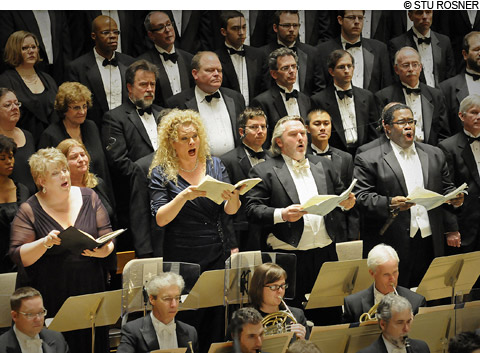
MORE BEETHOVEN! Christine Brewer, Michelle DeYoung, Simon O’Neill, and Eric Owens were featured soloists in the BSO’s Missa Solemnis. |
What an amazing array of music we've had lately. At Emmanuel Music, pianist Russell Sherman and tenor Frank Kelley, after their haunting Schubert Die Schöne Müllerin two weeks before, returned with Schumann's great Dichterliebe ("poet-love"), with Kelley in slightly dryer, less flexible voice, but achingly articulate, and Sherman uncannily transparent in his partnering. Sherman preceded this with a complexly playful Schumann Kinderszenen ("childhood scenes"), with its famously dreamy "Träumerei," played, like the rest, with a paradoxically unsentimental sense of nostalgia.The New England Conservatory Opera Theatre served up Offenbach's deliciously sexy and tuneful La Périchole. The singers, trapped by Joshua Major's broadly farcical staging — in which the heroine's teasing drinking aria, for example, had her flopping around blind drunk all over the stage — missed Offenbach's elegant slyness. But guest conductor Joel Revzen and the excellent orchestra got the style and tone exactly right.
A wonderful new series, Primary Source, presented by violinist Gabriel Boyers's Schubertiade Music, was inaugurated at Boston's Goethe-Institut with a contemporary 18th-century string quartet arrangement of numbers from Mozart's Magic Flute (14 of which were performed) and Beethoven's rarely-performed early Septet for Winds and Strings. The Mozart was pure delight, with violinist Gabriela Diaz getting all the great tunes, whether originally sung by soprano, coloratura soprano, baritone, or basso profundo. The Beethoven got a splendid reading, but made for a long evening. The unique twist is that Boyers, who's also a dealer in rare music books, manuscripts, and ephemera, had some spine-tingling documents on display, such as the first piano-vocal score of The Magic Flute, published the year after Mozart's death, with a fronstispiece depicting two angels weeping over Mozart's grave; and a broadside program for an 1801 performance of The Magic Flute with a cast that included Emmanuel Schikaneder, Mozart's librettist, repeating his original role of the birdcatcher Papageno.
The impressive New York ensemble Lunatics at Large gave a revelatory concert at Tufts, curated by visiting Tufts composer Kareem Roustom, of chamber music by young Arabic composers with scores ranging from the perfumed nostalgia of Karim Al-Zand's Quelques fleurs, to Zaid Jabri's heartbreaking elegy for the late Iraqi/Syrian composer Solhi Al-Wadi, to 26-year-old Mohammed Fairouz's startlingly fresh Unwritten, a setting of three David Shapiro sonnets about Socrates.
Then from another world entirely, the Handel and Haydn Society (which, the program notes reminded us, was founded in 1815, the year of the Battle of Waterloo), with guest conductor Jean-Marie Zeituni (of the Columbus Symphony), played an ambitious program of heroic music: Haydn's brass-and-drums Maria Theresia Symphony (No. 48, in C) surrounded by Beethoven's Egmont Overture and Symphony No. 3 in E flat, the astounding Eroica, conceived as a paean to Napoleon until Napoleon crowned himself emperor and Beethoven tore up the dedication.
Zeitouni conducts with style and polish and lots of ideas. The introspective minor-key Trio section of Haydn's vigorous third-movement Menuet became a surprise contrast to the public celebration of the rest. But vast Symphony Hall dwarfs the sound of period instruments, and though the Beethoven works were pointedly refined, the dynamics and pacing lacked the weight and heft to be fully heroic. Zeituni began the Eroica with a startling stroke: after bowing to the audience he swiveled around and suddenly Boom! Boom! — the two opening chords. The stealthy quiet playing was also affecting. Most successful was the poignant funeral march with its stabbing accents and the final dissolving disappearance of the cortège.